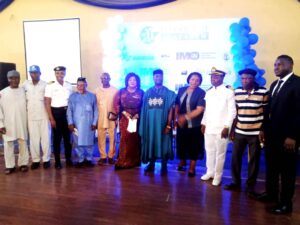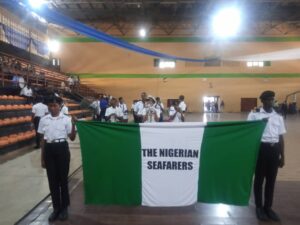By Joshua Yousouph
The joint body of the Nigerian seafarer’s professional groups has called for the unification of all seafarers to effectively tackle the challenges facing the industry.
 This call was made during the commemoration of the 2022 Seafarers’ Day organised by a coalition of the Merchant Seafarers Association of Nigeria (MESAN) and National Association Master Mariners (NAMM) under the aegis of the Joint Body of the Nigerian Seafarer’s Professional Groups on Tuesday in Lagos.
This call was made during the commemoration of the 2022 Seafarers’ Day organised by a coalition of the Merchant Seafarers Association of Nigeria (MESAN) and National Association Master Mariners (NAMM) under the aegis of the Joint Body of the Nigerian Seafarer’s Professional Groups on Tuesday in Lagos.
Speaking to journalists at the event, President of Maritime Professionals Forum, Captain Akanbi Oluwasegun, noted that the event came as a result the coming together of maritime professionals to address the too many divisions which has made the concerns of seafarers ineffective and less audible to the government.
Akanbi stated that one of the major problems affecting Nigerian seafarers is that there is no central body having a coordinated responsibility for seafaring in Nigeria. He however suggested that a bill for central professional coordination like the UK Merchant Navy Training Board should be enshrined in the Merchant Shipping Act or as a separate Federal Bill to unite all seafarers and address the code of conduct, etiquette, disciplinary measures, training and other issues for all seafarers.
In his words: “This event came as a result of Maritime Professionals Forum which concerns the Seafarers Merchant Seafarers Association of Nigeria and Master Mariners to address the too many divisions which has created a problem by reducing our voice. The only way we can have a strong singular voice when we unite and speak with one voice. In the previous years, we have been guest in our own event. NIMASA is a regulatory body you have the arrangement and packages but seafarers are being treated like guests. We have not decided to have our own celebration where NIMASA will now be a guest”.

“We are not here to fight anybody, enough of passing blames amongst NIMASA, Shippers owners or Seafarers. One of the problem affecting Seafarers is that there is no one central body having a coordination responsibility. We have regulators but there should be coordination. If there is a Federal bill uniting everyone like the UK Merchant Navy training board which takes care of the code of conduct, etiquette, disciplinary measures, training and all for seafarers, NIMASA will only come in as examiners and regulators”
“If we have one central body, we will not have different uniforms. We don’t even know ourselves, but by the time we centralise the ratings, seafarers, cadets and all, we would all have the same body and headquarters. This is different from a union, we are talking about professional coordination. We have that in the Merchant Shipping Act for example which is more robust or a different bill. Although unionism has a lot of role to play, but that does not eradicate the professional content of a central body which we are lacking. The Union is being coordinated by Trade Union Congress, but Seafarers is bigger than Trade Union. Unionism is not compulsory. But when you have a professional body, it is compulsory” Akanbi said.
Also speaking, the Secretary General of Merchant Seafarers Association of Nigeria (MESAN), Captain Alfred Oniye, said Nigerian seafarers are profile personalities, adding that they contribute immensely to the development of the nation’s economy.
While lamenting the unavailability of jobs for Nigerian seafarers, Oniye however called on the federal government to enforce the Cabotage Act by stopping foreigners from taking over Nigerian jobs. He also opined that seafarers who have the academic, professionals and operational qualifications in seafaring should be given positions to head departments in government agencies.
“The Federal Government should enforce the Cabotage law that any vessel sailing within the Nigerian water should be owned by Nigerians, not foreigners dominating our waters. If we enforce the Cabotage law over 50 per cent of Nigerians will have jobs.
“When foreign ships sail within Nigerian waters, the same ship is being occupied by foreigners, there is no single Nigerian there. So how will the Nigerian seafarer have job. If any ship is going to sail in the Nigerian water, the crew should be Nigerians and not foreigners. If this can be enforced under the Cabotage Act, we will limit the unemployment of Seafarers and when we start building ships before you know it we will eradicate this unemployment” Oniye stated.
Read Also: NARTO Warns Members Against Involvement In Illicit Practices, To Sanction Defaulters
Speaking earlier in his welcome address, Captain Rotimi Ogunsakin said Nigerian Seafarers have decided to awake from their slumber by uniting together to identify and address their challenges. He lamented that Nigerian certificates are not recognised even in the country which has created a platform for foreign dominance on Nigerian seafaring jobs.
Ogunsakin said there are competent Nigerians who can do the jobs but are limited with their certificates. He however charged the government to fine-tune and empower Nigerian seafarers and ensure their certificates are recognised in the country to prevent them from going to buy certificates outside Nigeria.
“Nigerians are not recognising Nigerians. If you study maritime in Nigeria and you have the highest certificate, you still cannot use it to get a job in Nigeria. Many of our ships are ‘limited’. We just need to fine-tune our people and see how we can be competent. Nigerian Seafarers should be able to dominate our waters.
“Let us empower what we have, organise our people and let them recognise the certificate they gave us to avoid people going to buy certificate. We have fake papers everywhere. It is very difficult to pass exams in Nigeria but you will get it at one sitting in Egypt. If Nigerians can operate in the health care system and fly all our local airlines then what is happening to us in Maritime?” Ogunsakin asked.
On his part, a Master Mariner, Captain Adewale Ishola noted that Nigeria needs to fashion out ways to implement the wages and salary structures of seafarers as it is done globally.
Ishola mentioned that only few Nigerians own ships, adding that some even charter ships to lift cargoes. He also said the running cost for these ships are very high and the country is not engaging Nigerian-owned vessels, but foreign vessels. Ishola stressed the need to acquiring more vessels to provide seatime for Nigerian Cadets and equally develop the economy of the country.
Kindly like us on Facebook















